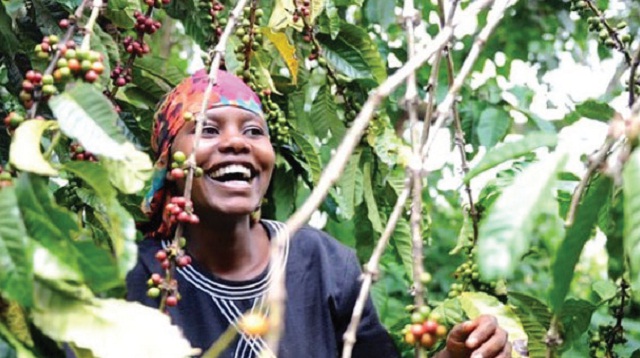
Kampala, Uganda | THE INDEPENDENT | Winnie Kabogoza a coffee farmer at Kasiiso village. She is among farmers who are against licensing of coffee growers
A section of Ugandans living in the diaspora want the National Coffee bill 2018 withdrawn saying it will lead to exploitation of the farmers and also a decline in the industry.
The Coffee bill proposes the registration of farmers, capturing details of the size of land, the number of coffee trees and particulars of the farmers, coffee buyers and sellers among others.
It also proposes that land, where the coffee is to be grown shall be evaluated by the Uganda Coffee Development Authority – UCDA will determine whether or not it is suitable for coffee growing. The bill also proposes a 2-year jail term for a farmer who fails to take good care of their coffee plantation.
According to Martin Byakuleka, the President Common League of Ugandan Diaspora (CLOUD) the Bill is an inconceivable and unfair to ordinary farmers. He questions how for instance a peasant can appeal to a Minister in case he is unfairly treated.
He says Government dismissed the agricultural extension workers who previously advised the farmers and supervised their crop administration, and the introduction of the bill is a ploy to victimize the same farmer for mistakes that may accrue due to absence of an agricultural extension worker.
“It is indeed true that the government is neither staffed nor reliant on the best human resources that Uganda can offer. It is our prayer that this misconception is not fraudulently perpetuated into parliament to become law, because thenceforth its administration will be grossly problematic.” says Byakuleka in press statement.
Byakuleka says because of this, Government should withdraw the unfair bill. He says the bill does not intend to help farmers, but instead it focuses on the multi-million companies and players in the industry.
“This Bill lacks integrity; it is devoid of originality because it is not responsive to a genuine internal crisis but a reaction to misconceived demands by foreigner traders,” says Byakuleka. He says the new coffee bill will disadvantage some tradition coffee growing areas in the country who have been living on coffee, which will be a form of social economic injustice.
Byakuleka asked Parliament not to pass this bill, unless absolute research and study on coffee is conducted.
By March this year, Government recruited 3,811 out of the 12,000 extension workers national strategy target.
*****
URN
 The Independent Uganda: You get the Truth we Pay the Price
The Independent Uganda: You get the Truth we Pay the Price


